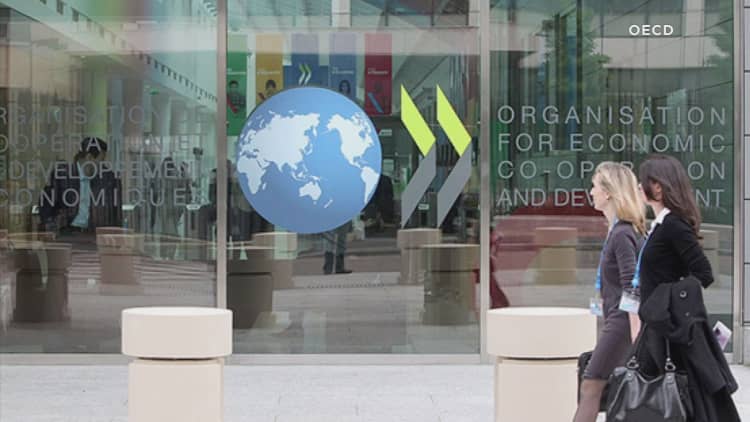
Central bank stimulus, the linchpin of the post-crisis global economy, is losing its effectiveness and creating a potential land mine for investors, according to the latest projections from strategists at bond giant Pimco.
While the Newport Beach, California-based firm said its forecast of most likely conditions entails slow but steady growth and gently rising inflation, it noted that "left tail" risks are rising. The reference is to a bell curve of likely outcomes, with the least desirable on the left tail and the most desirable on the right.
Exploding debt levels along with central bank policies — zero and negative interest rates and trillions of dollars worth of money printing — threaten to upset global stability.
"While there are myriad uncertainties, there is no doubt that a global disruption of our baseline scenario would have serious repercussions for growth, inflation and financial markets," Pimco strategists Andrew Balls, Richard Clarida and Daniel J. Ivascyn said in a report. "The risks are uncertain, but they are real, and active investors can aim to put a price on them."
The "baseline," or most likely, scenario is U.S. growth in the 1.5 to 2 percent range and inflation moving toward the Fed's 2 percent target, with the U.S. central bank gradually raising rates while fiscal policy takes the handoff for growth.
However, the consensus among Pimco experts was not to "take excessive comfort" in that scenario as "monetary policy exhaustion and an overhang of debt in some major economies pose material threats to the sustainability of the global recovery and financial stability."
For investors, choices will get more difficult: Capital preservation as opposed to risk, with diversification and opportunity seeking in emerging economies prevailing themes
"Overall, we expect to have more cautious positioning in our portfolios, and to make capital preservation the No. 1 priority," Pimco said. "We cannot rely solely on central bank support. The secular time frame is likely to remain a very difficult environment for investing, and we will seek to avoid investments where there is a real risk of permanent capital loss."
Questions over the impact of monetary policy come at a rough time both for the U.S. and global economy.
Second-quarter U.S. economic growth is projected at 2.5 percent after 0.8 percent in the first quarter. Recent economic data have been positive for housing and consumer spending, but the gains have been uneven. Financial markets have been sluggish, with the up about 2.5 percent year to date but still negative over the past 12 months.
Policy divergence has begun to creep into the global system, causing worries that the U.S. may be tightening too early while other central banks remain loose. The Organization for Economic Cooperation and Development this week strongly urged loose fiscal and monetary policy to break the global economy out of its "low-growth trap."
However, Pimco believes loose monetary policy has lost its bite, and "the costs of unconventional policy are rising."
"We now believe that there is a material risk globally — if not necessarily for the U.S. — that the unconventional monetary policies in place today will be insufficient to maintain global growth, close output gaps and bring inflation to target," the report said. "Furthermore, compared with the pre-crisis experience, with trend growth slow and with debt levels high, there are no obvious 'spare tires' available globally if and when monetary policy exhaustion threatens global stability."
From an investing standpoint, Pimco suggests "high-quality income-generating assets," along with selective opportunities in emerging markets and Treasury inflation-protected securities.




